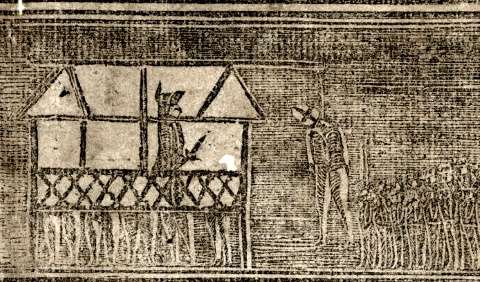William and Elizabeth Tuttle sailed to America in 1635 to become one of the founding families of the New Haven Colony. Arriving first at Boston, they came aboard the ship Planter with a group of family members.

Woodcut of New Haven, Conn., 1786, formerly New Haven Colony.
William’s brothers would settle in Massachusetts, while Elizabeth and William joined a group of colonists led by John Davenport and Theophilus Eaton. They moved south to start the New Haven colony, nearer the Dutch settlement in what is now New York.
William Tuttle belonged to the original 63 planters who established the New Haven Colony. His house stood on the same block on the town square with Eaton, across the street from Davenport’s own home.
But such lofty connections did not guarantee happiness for the Tuttle family. William and Elizabeth’s 11 children included two (at least) who were insane, one adulteress and two murderers.
The First Murder
On Nov. 18, 1676, Benjamin Tuttle visited his sister Sarah at her home in Stamford, where she lived with her husband. Sarah, 34, was six years older than Benjamin, a bachelor.
On that evening Sarah’s husband had left to visit a friend, and Sarah was upset he had left without first having dinner. Benjamin and Sarah engaged in a brief quarrel, with Sarah warning Benjamin, ”you need not be short with me.”
Benjamin stormed out of the house, and Sarah asked her daughter to close the door. Before the girl could act, Benjamin returned with an ax in hand. He struck his sister in the head, declaring, “I will take you to God.” He jammed his sister into the fireplace and rained down blows upon her, splitting open her head. He then ran into the woods.
Following his arrest, Benjamin had little to say in his defense. The Tuttle family had a long history of quarreling. He said he feared his sister would kill him.
A jury declared: “Thou has most wickedly risen up against thy sister Sarah the wife of John Slawson of Stamford . . . and smiteing her with an axe or some other instrument of death thou hast slayne her.”
The court sentenced Benjamin to death by hanging. Before he died, he asked that his estate go to his sister Elizabeth.
Divorce in the New Haven Colony
Elizabeth Tuttle had a scandal all her own. Married to Richard Edwards, Elizabeth would have seven children. But only six, apparently, belonged to Richard.
The Edwards – grandparents to the Rev. Jonathan Edwards – would divorce in 1691. Richard obtained the divorce after years of Elizabeth’s abusive and irrational behavior, he said.
Elizabeth largely disappeared from the historical record following that, though biographers of Jonathan Edwards have suggested her behavior helped inspire his Puritanical fervor.
A Second Murder
In 1691 the Tuttle family would endure one final scandal.
Mercy Tuttle, the youngest daughter of the clan, had married Samuel Brown in 1667 at age 17. The couple had several children, including a son, Samuel. They lived in Wallingford.
It would come out later that Mercy Tuttle was erratic in her behavior throughout life. (Her older brother, David, had also been judged insane years earlier.)
When Mercy’s husband died in 1691, there was no longer anyone to act as a check on her. On the night of June 23, she attacked her son Samuel with an ax and killed him. Mercy admitted she had killed her son, but said it was not done out of malice. Instead, she said, the murder was committed “at the instigation of the devil.”
In October 1691, the court convicted Mercy of murder, but withheld sentence until 1693. Then it ruled: “Having weighed the evidences given in, to prove that she hath generally been in a crazed or distracted condition as well long before she committed the act, as at that time, and having observed since that she is in such a condition, do not see cause to pass sentence of death against her, but for preventing her doing the like or other mischief for the future, do order, that she shall be kept in custody of the magistrates of New Haven.”
And that’s where she died, in the custody of the magistrates of the New Haven Colony her father had hoped to build.
If you enjoyed this story about the New Haven Colony, you may also like to read about why it joined Connecticut here.
Thanks to Families of Ancient New Haven, Donald Lines Jacobus; Murdering Mothers: Infanticide in England and New England, Peter C. Hoffer , N. E. H. Hull and The Descendants of William and Elizabeth Tuttle, George Frederick Tuttle. This story about the New Haven Colony was updated in 2021.





14 comments
Oh my – this is my family. I descend from William’s son John Tuttle.
I descend from Ann tuttle Judson Hurd b 1632 m to John Hurd b 1639. Ann is the daughter of William and Elizabeth Tuttle. From everything I have read,the story is true.
Hannah was Baptized as Anne on 1/20/1633
John the oldest child was Baptized on 12/8/1631 in England.
I am researching my ancestors all born in Northern Ireland their names are McIvor / McIver, Trimble, Hamilton, Rush, Sinnamon, Montgomery, Jackson and Watt.
Any help much appreciated, I have a lot of family information which I am willing to share with others.
Thank you, From Robert.
Wow, what a story!
[…] had just arrived in Massachusetts in 1637 at the age of 28 with his family. His older brother Theophilus Eaton moved on to Connecticut and started the colony of New Haven. Nathaniel Eaton stayed behind in […]
My family has a direct male line straight through to William and Elizabeth Tuttle through their 4th child Jonathan Tuttle who was baptized on 7/8/1637 in New Haven County, Connecticut
[…] a new country where they could practice their religion in peace. However, they also found America appealed to men and women who had other matters to escape. William Schooler was one of […]
[…] a New Haven institution since 1639, when the Puritans established the parish. The first minister, John Davenport came with Theophilus Eaton to settle New Haven. By the 19th century, the First Congregational Church was New Haven’s most […]
[…] Theophilus Eaton, New Haven’s governor, consulted John Winthrop in Massachusetts about Plaine. Winthrop wrote in his journal that Plaine 'corrupted a great parte of the youth of New Guilford by masturbation, which he had committed, and provoked others to the like, about 100 tymes.' […]
We descend from (9th great-grandmother) Elizabeth (Tuttle) Edwards’ daughter Ann Edwards. Fortunately, the rest of us are fine!
[…] old and distinguished Puritan family. He was born in 1716 in Stamford, Conn., the great-grandson of the John Davenport who settled New Haven. A bright child, he entered Yale to follow his father and grandfather into the Puritan ministry. He […]
[…] she hath generally been in a crazed or distracted condition as well long before she committed the act, as at that time, and having observed since that she is in such a condition, [we] do not see cause to pass sentence of death against her, but for preventing her doing the like or other mischief for the future, do order, that she shall be kept in custody of the magistrates of New Haven. […]
Comments are closed.